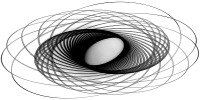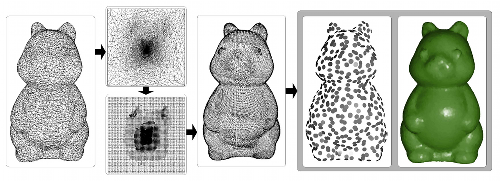J. A. Quinn, F. C. Langbein, R. R. Martin. Low-Discrepancy Sampling of Meshes for Rendering. In: Proc. Symp. Point-Based Graphics, Eurographics Assocication, pp. 19-28, 2007. [DOI:10.2312/SPBG/SPBG07/019-028] [PDF]
A novel point sampling framework for polygonal meshes is presented, based on sampling a mesh according to a density-controlled low-discrepancy distribution. The local sampling density can be controlled by a density functional defined by the user, e.g. to preserve local features, or to achieve desired data reduction rates. To sample the mesh, it is cut into a disc topology, and a parametrisation is generated. The parameterised mesh is sampled using a Hilbert curve in the parameter domain, which is adapted to parametric distortions and mapped onto the mesh. 1D sample points along the Hilbert curve are then generated, correcting for parametric distortion and a user-specified local density, to give a density-controlled low-discrepancy sampling of the mesh. After a pre-processing step, the sampling density can be adjusted in real-time. Experiments show that this approach can quickly resample existing meshes with low discrepancy samples. The effectiveness and speed of the approach are demonstrated by applying it to viewpoint dependent rendering, level of detail representation, and interactive remeshing.
![]() This work is licensed under a Creative Commons Attribution-NonCommercial-ShareAlike 4.0 International License.
This work is licensed under a Creative Commons Attribution-NonCommercial-ShareAlike 4.0 International License.

